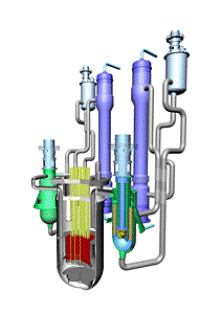Mitsubishi to develop Japan's next fast breeder reactor
18 April 2007
The Japanese government has selected Mitsubishi Heavy Industries (MHI) as the core company to develop a new generation of fast breeder reactors, in an initiative promoted by the Japan Atomic Energy Agency (JAEA).
 The government bodies involved - the Ministry of Education, Culture, Sports, Science & Technology, and the Ministry of Economy, Trade and Industry, together with the Federation of Electric Power Companies of Japan and the JAEA - opted to concentrate responsibility and authority for fast breeder reactor (FBR) development into one core company, possessing "technological development capabilities and tangible achievements in this area."
The government bodies involved - the Ministry of Education, Culture, Sports, Science & Technology, and the Ministry of Economy, Trade and Industry, together with the Federation of Electric Power Companies of Japan and the JAEA - opted to concentrate responsibility and authority for fast breeder reactor (FBR) development into one core company, possessing "technological development capabilities and tangible achievements in this area."
Unlike most of the reactors used today for nuclear power generation, FBRs make maximum use of uranium resources by generating more fuel than they consume. They do this by using fast neutrons to "burn up" uranium and plutonium mixed oxide (MOX) fuel, which can be surrounded a uranium "blanket" in which slightly more plutonium is created than is used. The MOX fuel uses the plutonium recovered when spent fuel, including that from conventional light water reactors, is reprocessed.
Recycling plutonium could potentially provide a long-term stable energy supply, and the Japanese government sees the FBR as the main nuclear power generation system for the 21st century, superseding light-water reactors. Japan already has experience with fast reactors, with the Joyo prototype reactor, operating since 1977, and the Monju prototype FBR which started up in 1994. Monju has been off line since a sodium leakage in 1995 but it is slated for restart, possibly in 2008.
MHI has been actively engaged in FBR development since the 1960s. The company plans to establish a new unit by March 2008 to orchestrate engineering activities and carry out development, looking towards construction of a demonstration FBR by 2025 and a commercial reactor for introduction by 2050. The government has allocated 13 billion yen ($109 million) for development of the next generation reactor over the next year.
Further information
Mitsubishi Heavy Industries
Japan Atomic Energy Agency
WNA's Nuclear power in Japan information paper
WNA's Fast neutron reactors information paper
WNA's Mixed oxide fuel information paper